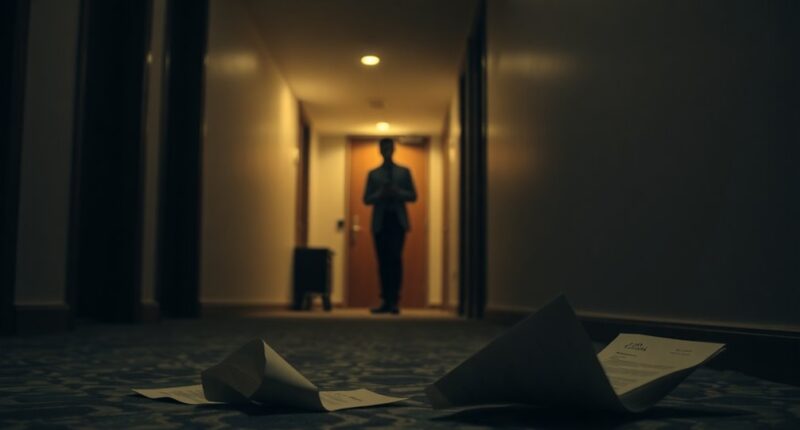Paul Schrader is facing serious allegations of sexually harassing his assistant and reneging on a confidential settlement. His legal team dismisses the claims as desperate and frivolous, but emails and documents suggest a troubling pattern of behavior. The case highlights significant power dynamics in the film industry and raises questions about accountability for harassment. As this legal battle unfolds, the public’s interest continues to grow, revealing more about the implications of such allegations.
Key Takeaways
- Paul Schrader faces allegations of sexual harassment from a former assistant, including invitations to his hotel room under false pretenses.
- After a confidential settlement was reached, it was contested in court, leading to ongoing legal battles.
- Evidence, including emails and documents, suggests a pattern of inappropriate behavior and a breach of professional boundaries.
- Schrader’s defense claims the allegations misinterpret friendly interactions, asserting a lack of substantial proof from the assistant’s side.
- The case highlights critical issues of power dynamics and accountability in the film industry, drawing significant public and media attention.

Schrader’s legal team has dismissed these claims as “desperate, opportunistic, and frivolous.” They argue that a confidential settlement was initially reached but has since been contested in court.
However, Doe’s legal filings highlight a troubling pattern of behavior, including invitations to his hotel room under false pretenses, where he allegedly exposed himself. After rejecting these advances, Doe claims she was dismissed from her job after over three years of service.
Doe’s legal filings reveal a disturbing pattern of behavior, including false invitations and retaliation after rejecting advances.
In court, Doe’s team emphasizes that her termination is directly linked to her refusal of Schrader’s advances. They cite emails revealing Schrader’s romantic expressions and an awareness of her discomfort. These documents add weight to the claims, as they indicate a persistent breach of professional boundaries. Notably, one incident involves Schrader allegedly assaulting Doe at the Cannes Film Festival in May 2024, which underscores the severity of the accusations.
Schrader’s attorney contends that the allegations are misleading, pointing to positive interactions on social media as evidence against Doe’s narrative.
As the legal battle unfolds, Schrader’s team argues that the assistant’s claims have inconsistencies and lack substantial proof. They frame the situation as a misinterpretation of friendly behavior rather than harassment. Furthermore, they assert that Schrader’s retraction of the settlement stemmed from personal conscience rather than legal failure.
The assistant’s legal team insists they’re pursuing legitimate recourse to enforce the alleged settlement. They believe it’s essential to secure justice in a case that raises important questions about power dynamics and accountability in the film industry.
As this situation develops, it continues to draw public attention and scrutiny.
Frequently Asked Questions
What Films Has Paul Schrader Directed?
Paul Schrader’s directed films showcase a variety of themes and styles.
You’ve likely seen his early works like “Blue Collar,” “Hardcore,” and “American Gigolo,” which explore labor, the adult film industry, and lifestyle choices.
His later films include the critically acclaimed “First Reformed” and “The Card Counter,” both of which delve into deeper psychological and moral issues.
Each film reflects his unique storytelling vision and artistic evolution throughout his career.
What Is Paul Schrader’s Background in the Film Industry?
Paul Schrader’s background in the film industry is rich and layered. He started as a film critic, influenced by masters like Ozu and Bresson.
You’ll find his screenwriting shines in classics like “Taxi Driver” and “Raging Bull.” As a director, he took bold risks with films like “American Gigolo.”
His journey reflects a blend of scholarly insight and creative ambition, shaping the cinematic landscape while challenging norms and exploring profound themes.
How Has the Public Reacted to These Allegations?
The public’s reaction to the allegations has been intense.
You’ll see strong outrage on social media, with many criticizing the alleged behavior and expressing disbelief.
Support for the victim is evident, as people emphasize the importance of speaking out against harassment.
Industry insiders are distancing themselves, raising concerns about accountability.
What Legal Actions Can Be Taken in Harassment Cases?
In harassment cases, you can pursue powerful protective measures.
Start by gathering evidence like witness statements and documented incidents.
Then, consider legal proceedings, such as filing a lawsuit or an EEOC complaint.
If you prefer a private path, mediation or arbitration might work.
Always protect yourself with restraining orders if needed, and don’t hesitate to seek legal advice to navigate your options effectively.
You deserve justice and peace of mind.
What Are the Potential Consequences for Schrader if Found Guilty?
If someone like Schrader is found guilty in a harassment case, you could face significant consequences.
You might encounter civil liability, including hefty financial penalties and legal fees. Your reputation could take a hit, leading to industry blacklisting and loss of collaborations.
Public backlash and negative media coverage may also diminish your influence and support. Additionally, you could face further litigation or even criminal charges, impacting your career and financial stability.
Conclusion
In a world where filmmakers should inspire, Paul Schrader’s actions are a shocking plot twist no one saw coming! You can’t help but feel the weight of this scandal, as it unfolds like a poorly written script. With accusations of harassment swirling and a settlement gone awry, it’s like watching a train wreck in slow motion. Let’s hope this isn’t the next cinematic masterpiece, but rather a wake-up call for accountability in Hollywood.








